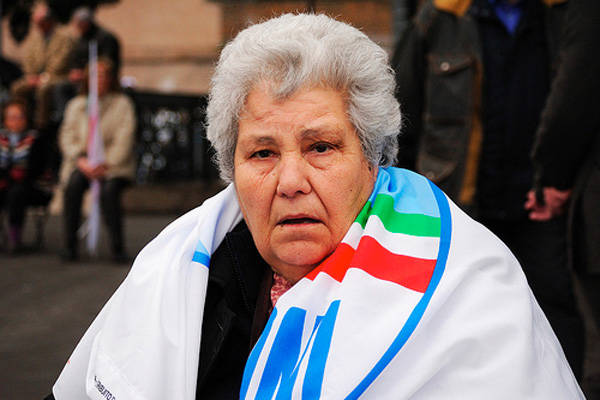Back in the Saddle with Silvio
With the hurdle of last weekend’s regional elections safely behind him, Italian Premier Silvio Berlusconi, 73, is solidly back in the saddle, and virtually certain to enjoy a three-year hiatus before another election can come along to unhorse him, if it can. Despite its campaign of “phony scandals” against him, “We have given the left a lesson,” Berlusconi trumpeted from Rome Monday evening.
Berlusconi thus sails into both national general elections and the election of a successor to Giorgio Napolitano as Italian president in 2013 from a comfortable position. Still, the ride promises to be bumpy, less because of his humbled and quarreling opposition, than because Umberto Bossi, the partner who gave Berlusconi this victory against the odds, will claim his reward. His populist right-wing, anti-immigrant Northern League will now control most of the wealthy industrial North, winning in the Piedmont and the Veneto while doubling its results in Lombardy. “And now, federalism,” the gleeful League leader in Piedmont, Roberto Cota, promised.
The political shellacking of the left can be put down to fragmentation and disaffection, with the result that, as a delighted Bossi proclaimed, “In the North the left disappeared.” The opposition Partito Democratico (PD) slumped from its 34.1% of the 2008 vote in national general elections to around 27%. A few spoilers out there are also being blamed, such as Antonio Di Pietro, whose Partito dei Valori in Lazio claimed around 10% of the vote. In Emilia, Beppe Grillo won 7% in another classic example of a protest vote.
But the real spoiler on the left were the stay-at-homes, or around 1.5 million who abstained. Most of these demotivated Italians are believed to have been on the left, and indifferent to the pleas from the left leaders when not downright hostile to them. This is the high price still being paid for the two years of fractious government under former center-left Premier Romano Prodi.
The left was not the only loser. Pier Ferdinando Casini’s Catholic party, which had sought to occupy a middle ground between right and left, fared poorly. And Berlusconi’s official ally, Gianfranco Fini, whose own rightwing political party Alleanza Nazionale merged into the PdL, has been increasingly and visibly at odds with Berlusconi. It is an election irony that Berlusconi’s PdL itself appears significantly weakened, its voting losses compensated by the Northern League victory. However, the relative strength of the League, vis-à-vis the weakened PdL, means that within the governing coalition Berlusconi will need to seize the high ground to mediate between Fini and Bossi—hence Berlusconi’s interest is to prop up Fini as counterweight. And this may explain why the Premier is now saying that he harbors no animosity toward Fini, whom he expects to bring back into the fold. In addition, Berlusconi’s presidential ambitions for 2013 make Fini’s support important, especially because, as president of the Chamber of Deputies, Fini will run that election, which requires a two-thirds majority for the first three votes, but a simple majority thereafter.
Although the full official tally is not in, Berlusconi and allies in the Partito della Libertà (PdL), which previously held only two of the thirteen regions holding elections [of a total of 20], have bounced up to six. Besides snagging powerful Piedmont for the first time, they also won in hotly contested Lazio, where the better known and more experienced Radical party candidate, Emma Bonino, lost by a hair to her rival, former trade unionist Renata Polverini.
Berlusconi’s staffers are saying that his star quality at a concluding campaign rally in the vast Piazza San Giovanni in Rome turned around what had begun to appear a lost cause. At that rally ten days ago the organizers claimed attendance by one million people, arriving in four special trains and 3,000 buses, even though the Ministry of the Interior cut that figure by three-quarters and said that the police counted fewer than 250 buses. (The Ministry doing the counting, by the way, is already in the hands of the Northern League.)
Entering the campaign Berlusconi seemed weak. The ongoing recession has cost the country 500,000 jobs, and for the past two years the promised reform projects were on hold while Berlusconi dealt with the judiciary he openly despises and court proceedings brought against him. In the background were scandals involving paid “escorts” who took photos and made tapes in his bedroom and accusations, including by his estranged wife, of his affairs with underaged girls. But he campaigned accusing the left of “social envy,” and the same elements listed above seem to have boomeranged in his favor. The loss of jobs frightened many voters, who felt more secure with him. The accusations of his immorality evoked, if not social envy, than at least envy. A managed media, especially TV, helped; when the Milan trial of the notorious David Mills, accused of funneling overseas bribes on behalf Berlusconi, was dropped two months ago because it fell into praescription (that is, the legal terms of action expired), RAI TV Channel 1 announced, erroneously but intentionally, as its director has since admitted, that Mills was “acquitted.”





































i-Italy
Facebook
Google+
This work may not be reproduced, in whole or in part, without prior written permission.
Questo lavoro non può essere riprodotto, in tutto o in parte, senza permesso scritto.